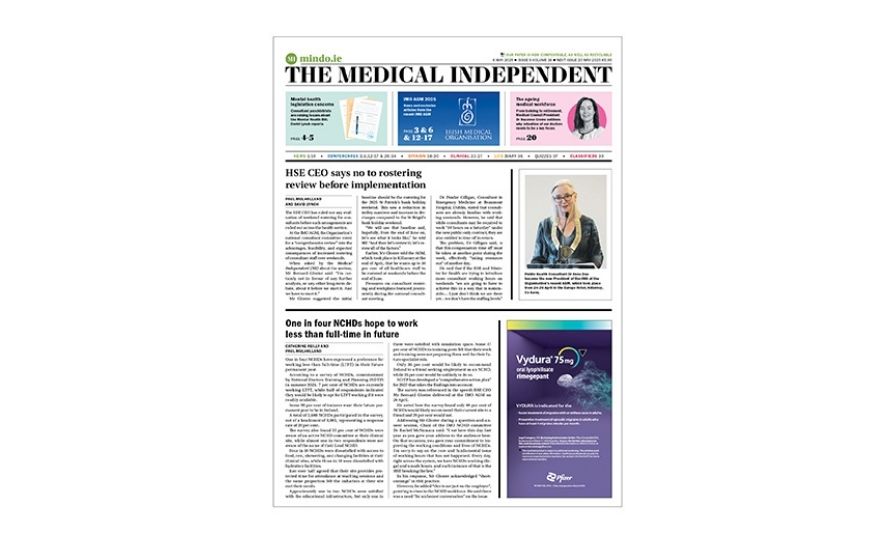<h3 class=”HeadB25MIstyles”>Govt’s proposal for general practice was ‘off the wall’ — IMO CEO</h3>
The Department of Health and HSE’s vision of a “post-FEMPI era” as communicated to the IMO in May “made the current situation in general practice look like a holiday in Hawaii”, according to the union’s CEO Ms Susan Clyne.
She was speaking in Limerick at the 33rd Annual Conference of Rural, Island and Dispensing Doctors chaired by Mulranny GP Dr Jerry Cowley.
“It would be better to stay as you are than move into their vision,” Ms Clyne told GPs. “They had a very limited amount of money. Now, they never say what the money is, but we all know what the money is. They wanted everything for that amount of money.”
Ms Clyne continued: “This post-FEMPI era saw that €120 million discounted down in the same way it was in the public service, and for the balance of whatever was left, you were going to do new services. You were absolutely going to have your new GP contract; that wasn’t a problem, because a contract is a piece of paper… but you were going to do all these new services and basically hand Sláintecare over to people on a plate.”
She said FEMPI restoration at €120 million was about sustainability and could not cover new services.
The IMO advised Government it would not return to talks until there was a change of approach. Ms Clyne said this was “a difficult thing to do because it is easier to be in the game”.
However, “the proposal was so off the wall, the amount of money was so little for what was expected, it wasn’t possible to do a deal; it wasn’t possible to even start talking about it and negotiating.”
She said the IMO had been in negotiations with the Department and the HSE during 2017 and “we had more-or-less reached agreement in terms of chronic disease, special items of service and capacity measures. In many ways, the argument with the Department and the HSE has been won, insofar as they do understand the need to invest in general practice.
“Where the argument becomes more difficult and who is controlling all departments, is with DPER, and with Paschal Donohoe and the mandarins in DPER, who simply see ‘health’ as the ‘black hole’, ‘Angola’ and all the other names they talk about it and will resist putting any money into anything. So they don’t have a special place of hate in their heart for GPs; they hate ‘health’ generally. And they don’t hate GPs in particular, they just hate ‘health’; they see it as a complete waste of money.”
The IMO was due to meet with the Department of Health and HSE on 10 October, according to Ms Clyne, and this followed a letter of sanction from the DPER.
She told the conference the “key message here is to work to your GMS contract”.
“In rural general practice in particular, you deliver a range of services for which you have no contractual obligation and as long as you deliver, they will never come to pay you, because why would they, they are getting it for nothing… You are delivering way over and above your contract and under competition law, I will remind you that you are entitled to do that and it is not my job to tell you not to do it. But I am just saying, you have a choice.”
<h3 class=”HeadB25MIstyles”>‘Situation worse’ than when NAGP relaunched — Association’s CEO</h3>
The NAGP’s CEO Mr Chris Goodey told GPs at the Annual Conference of Rural, Island and Dispensing Doctors in Limerick that they had been “failed” by their representative bodies.
Mr Goodey said he had taken up the post of NAGP CEO six years ago “and it is actually worse now than it was six years ago, and it should have improved. The job of your union, your representative body, is to make it better, and it is worse.”
His comments followed a short speech by NAGP President Dr Maitiú Ó Tuathail, who said he did not see a future for himself in rural general practice. “I believe rural general practice has been failed by our Government, and actually by our unions as well,” said Dr Ó Tuathail.
Mr Goodey told the conference he had visited 250 practices since 1 June and encountered “exhaustion, tiredness, apathy, burnout — all the adjectives you can possibly imagine and we are not doing anything, we are not achieving anything”.
He said that having seen “the devastation of general practice”, it was now time to “fight”.
“And we were trying to do that with the sickness certs,” added Mr Goodey, acknowledging this was a “cheap fight”.
He said the NAGP sat opposite the HSE and Department of Health for a year “going through what I would consider a process of a roundabout, or Ryanair circling pattern”.
When the Minister of the day can set fees and “your only ability is as a group of individuals — as what we would describe as ‘false self-employed’ — is to withdraw services or say no collectively, and I know everybody is worried about that terminology but that is a battle that we have to have.”
In reference to the IMO and NAGP, Mr Goodey said the Government was “playing one off the other” and “we have to be united in our thinking”.
“It is not about me, it is not about the union, it is about general practice… Our focus is on improving the lot of general practice and we have failed you; we have absolutely failed you and I am sorry for that, I apologise, but we won’t get any improvement at all unless we work together and unite.”
NAGP Council member and Kerry GP Dr Bríd Walsh told the meeting: “If you say you care for general practice, if you say you are standing up for it and fighting for it, then stand the hell up, stop accepting a union that tells you ‘we couldn’t possibly negotiate better for you’.”
Dr Walsh’s comments followed a presentation from IMO CEO Ms Susan Clyne, who said the Organisation withdrew from GP contract talks in the summer when an “off the wall” offer was made by Government.
Speaking to the <strong><em>Medical Independent</em></strong> (<strong><em>MI</em></strong>), Mr Goodey said that without the ability to act collectively, “you have no position of negotiation”. He said this was why the Association was developing a submission to the Competition and Consumer Protection Commission (CCPC), calling for GPs to be deemed “false self-employed”. He said this submission is in the process of being finalised.
<h3 class=”HeadB25MIstyles”>People dying while awaiting DEXA scans — rheumatologist</h3>
People waiting years to access DEXA scans are dying from the complications of fracture, a leading rheumatologist has warned.
Speaking at the Annual Conference of Rural, Island and Dispensing Doctors in Limerick, Prof John Carey, Consultant Rheumatologist at University Hospital Galway (UHG), said “a lot of people have died on our waiting list waiting for a DEXA scan”.
During austerity, “our hospital closed our DEXA machine [and] took away our osteoporosis nurse”.
“We have people waiting since 2005 now for DEXA scans… the European Commission said about 15 years ago that every country in the EU should have access to DEXA scans, along with lots of other things, basically because of the cost and size of the problem with osteoporosis. This year, the World Health Organisation came out and said nobody should die waiting for a diagnostic test.”
About one billion people globally had osteoporosis or were at high risk of the disease, said Prof Carey.
He strongly criticised the absence of a national clinical programme for osteoporosis.
“In Galway University Hospitals, we have all the hip fractures on a database since 2004 and at one year, one-in-five women and one-in-three men are dead; those numbers are about twice the international norms now, where they have effective [national] programmes for managing these patients. They don’t have anything we don’t have, with one exception — they have organisation.”
Speaking to the <strong><em>Medical Independent</em></strong> (<strong><em>MI</em></strong>), Prof Carey said an appointment had recently been made at UHG to get the DEXA machine operational. “It was up-and-running full-time in 2007 but once the cuts came in, in 2008, because of the staff hiring freeze, there just weren’t enough staff to do x-rays and DEXAs. The machines were there… there just wasn’t enough staff available to do what needed to be done.”
Asked about the average waiting time for a DEXA scan, he said “years”.
Prof Carey and colleagues have been pushing for a national clinical programme in osteoporosis for the last decade, but to no avail.
On why this was the case, Prof Carey noted that clinical care for the disease was multidisciplinary.
Areas like heart disease, cancer and diabetes were “big political items”, but osteoporosis was “just as big a problem”, he told <strong><em>MI</em></strong>.
<h3 class=”HeadB30MIstyles”>ICGP past-President questions abortion services timeline</h3>
The time-frame around the introduction of abortion services does not seem realistic, a senior ICGP representative told the Annual Conference of Rural, Island and Dispensing Doctors.
Minister for Health Simon Harris has stated his commitment to commencing abortion services in Ireland by 1 January 2019.
However, Dr Richard Brennan, immediate past-President of the ICGP, told the conference in Limerick that the College will need to see the “final layout of the legislation” before it can devise a guideline “that is compliant with the legal Bill that is eventually passed, so there will be a certain bit of delay in that”.
He said “the notion we can go within seven months of passing a referendum, to having legislation, to have a service, is really, really unrealistic.
“What is really important is that we have the correct legislation, the correct guidelines and the correct service to assist our patients… The clinical guidelines and care pathways are actually for patients; patients have to be able to navigate the healthcare system.”
Earlier at the meeting, IMO CEO Ms Susan Clyne warned that “it is quite possible legislation is going to go through before the clinical guidelines are done”.
Dr Brennan also referred to “a lot of misrepresentation about what the College was doing or not doing in the last 12 months” in terms of the abortion issue. He said the College had tried to stay neutral in the referendum, as it recognised “a complete diversity of views within the general practitioner population”.
He said the College supported the introduction of a 24-hour crisis pregnancy helpline, which could also help to avoid “some conflicts that may arise around people who have conscientious objection”.
Dr Brennan said the Medical Council was the relevant body in respect of ethical guidelines.
“I think it is important that people who do have conscientious objections, that those are recognised but conscientious objection cannot necessarily translate into obstructing State delivery of a healthcare right for people… ”
He added that the College has been consulting widely on the introduction of abortion services and is holding a number of regional meetings in October and November.
Speaking to the <strong><em>Medical Independent</em></strong> at the meeting, Dr Brennan underlined that “we can’t actually finalise the guideline until we know what the legislation [is]… it is going to be a very tight ask and I am not sure how realistic [it is]”.
While the legislation will provide a legal basis for the service, “the question is, will the full service be up-and-running on 1 January, and I find that a tight timeline at the moment”.













Leave a Reply
You must be logged in to post a comment.